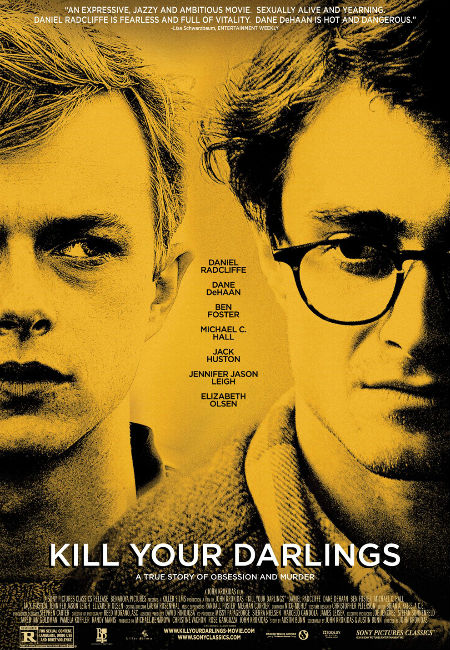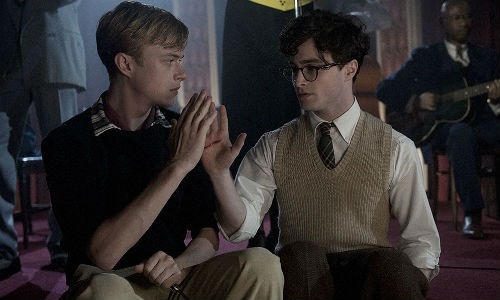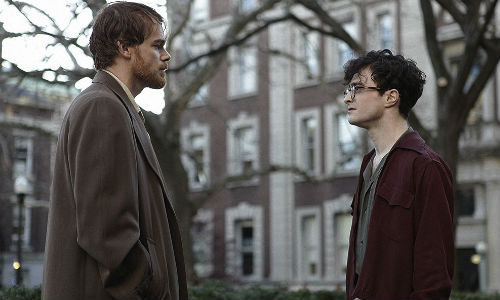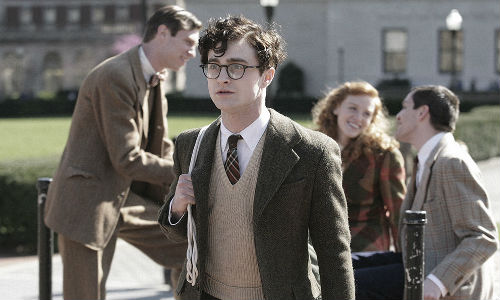
If you have spent any time at all around around writers, William Faulkner’s immortal advice to “kill your darlings” will be something with which you are intimately familiar.
A clarion cry to all dedicated wordsmiths to parse down their text to only that which makes the prose or poetry sing, it is treated as gospel in creative circles, a dogma for the ages.
That is largely because it is sage advice, a call to only keep that which works, and dispense cold-bloodedly with that which does not.
In John Krokidas’s directorial debut, it takes on a whole new hue among a noteworthy group of literary aspirants attending Columbia University in the final years of World War Two, when one of them appears to take the advice literally with personally calamitous results.
Kill Your Darlings focuses on the relationships between these would-be literary greats – Allen Ginsberg (Daniel Radcliffe), William S. Burroughs (Ben Foster) and Jack Kerouac (Jack Huston) who more than definitively go on to fulfil their promise as the founders of the Beat generation – and the way in which they form a world unto themselves.
A suffocatingly incestuous world it must be said, with each of them overly obsessed with the other to one degree or another.

And it is one into which comparative babe in the woods Ginsberg walks one night when he meets the disaffected and deeply troubled patrician-esque Lucien Carr (Dane DeHaan in a riveting performance) and is inducted into his madly bohemian life, an event which Carr later assures a doubting Ginberg made him, since it changed his life from “ordinary to extraordinary”.
At that later tension-fueled point in the film, Ginsberg may well have just cause to argue but initially at least, grappling with the prestigious and academically-demanding world of Columbia, and a co-dependent mother (masterfully played by Jennifer Jason Leigh) with mental health issues, he is entranced by which the libertine appeal of Carr’s messy existence and the opportunity it offers for a rebirth of some kind.
He giddily plunges into the West Village lifestyle of Carr, and his go away-come closer lover David Kammerer (Michael C. Hall) and friend Burroughs, intoxicated as much by the subversive intellectual ideas which are their conversational currency as he does by benzedrine capsules and nitrous oxide and hashish that often accompany their wild discussions.
He is a man reborn in a sense, freed from the constraints of his neatly pinned down family, and together with Carr, who cannot write, and Kerouac and Burroughs, he gives rise to The New Vision movement, precursor to the society-changing Beat generation.
Its stated aim is to disrupt the established order, but as the events of the film make clear, creating something revolutionary, as Ginsberg et al aspire to do, is always often fatally hampered by the fact that humanity does not change with it, thus dooming whatever new thing is built in its place with the failings and limitations of the old regime.

While The New Vision philosophy hardly begets a revolution, it’s only real effect being to take some banned books such as Ulysses and Lady Chatterley’s Lover from the vaults of Columbia’s library and place them on display, it is lived out with all the fervency of the newly converted, an intellectual indulgence which seems desperately important to the men who try their best to propel it forward but has little effect otherwise.
In the end it is undone by the strained ties between the members of the group, who are unable to transcend their often messy and destructive rivalries so that who they are is a match for the unabashed idealism of their intellectual proclamations.
Their revolution is stillborn, as is Ginsberg’s besotted longing for Carr who is unable to come out from behind the unassailably high emotional walls that surround him and embrace a substantive, real relationship with another human being, a failing which eventually has deadly results.
It is Carr’s inability to fully function as a person that undoes the object of Ginsberg’s nascent queer affections, and eventually that of the group, at least in their first incarnation, and dooms their aspirations, both intellectual and personal, to failure.

That Ginsberg, Burroughs and Kerouac picked up the pieces from this dark period in their lives is a matter of historical record but Kirokidas does an impressive job of suggesting that their adventures in revolution-seeding may be their great undoing, match the dark emotional tone of the film with an equally restricted and subdued visual tone.
Killing Your Darlings is one of those movies that dares to confront our need to believe in something greater than themselves, daring to question whether it will ever amount to anything worthwhile.
That it is confronting is true, but it is a worthwhile discussion to have since the truly great steps forward in humanity’s seemingly relentless progress have come from men and women with an eye on what is possible and a wise acknowledgement of those things that may derail it.
Kill Your Darlings is a salutatory lesson, as well as an engrossing human drama of the highest order, of what happens when the former is pursued at the expense of the latter.